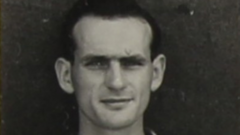Who Was the Officer Behind Nazi Propaganda in Welsh?

Published: 2025-09-07 19:35:12 | Category: wales
This article explores the complex life of Raymond Davies Hughes, a Welsh warrant officer who controversially collaborated with Nazi propaganda during World War II. Known as "The Welsh Lord Haw Haw," Hughes faced a court martial for his broadcasts aimed at Welsh troops, raising questions about his motives and the extent of his collaboration. His life story intertwines with themes of betrayal, survival, and the blurred lines between ideology and opportunism.
Last updated: 17 October 2023 (BST)
Key Takeaways
- Raymond Davies Hughes was a warrant officer who collaborated with the Nazis during WWII.
- His broadcasts targeted Welsh troops and were rooted in propaganda efforts led by Joseph Goebbels.
- Hughes faced a court martial and was sentenced to five years, later reduced to two.
- His wartime actions raise questions about his motivations as a collaborator.
- Post-war, he found success in business and had a stable family life.
Early Life and Background
Raymond Davies Hughes was born in Wavertree, Liverpool, in 1923 but grew up in Flintshire, Wales. His early life was marked by brushes with the law, including a caution at the age of 11 for deception, which foreshadowed a life punctuated by questionable choices. After leaving school, he worked in a local shoe shop, eventually managing the Bangor branch before being dismissed under unclear circumstances. This turn of events led him to enlist in the Royal Air Force (RAF) in 1941.
Military Service and Capture
Hughes served with the Royal Australian Air Force, participating in bombing raids from RAF Bottesford. His military career took a drastic turn when he was shot down over Peenemunde, Germany, during his 21st mission in August 1943. Captured as a prisoner of war (PoW), he soon found himself in a Dulag Luft interrogation camp, where his actions would set the stage for his controversial future.
Initial Collaborations with the Nazis
While at the interrogation camp, Hughes reportedly revealed his willingness to betray fellow PoWs in exchange for better treatment. He advised them to fill out Red Cross forms that divulged more information than required, which was promptly intercepted by German authorities. This act of treachery caught the attention of Professor Reinhard Haferkorn, head of English Propaganda for the German foreign office.
Haferkorn, a noted supporter of the Nazi regime, recognised Hughes' potential utility. He tasked him with crafting anti-Semitic and anti-Communist content for broadcasts aimed at undermining the Allies. Despite his efforts, Hughes struggled with the requirements of his role, often failing to produce coherent work. His ineptitude ultimately became a critical factor in his later legal proceedings.
Broadcasting for the Nazis
Hughes was eventually transferred to work directly under Joseph Goebbels, the Nazi propaganda chief. His role involved broadcasting messages to Welsh troops fighting in the Mediterranean, for which he received a monthly salary of approximately 500 Reichsmarks—equivalent to around £2,500 today. This financial incentive was coupled with the luxury of having his own flat in Germany, a stark contrast to the conditions experienced by many PoWs.
The Nature of His Propaganda
Hughes defended his actions by claiming to have embedded covert messages in traditional Welsh songs, intending to signal to Allied forces. However, evidence of his broadcasts was scant, as recordings were not preserved, and no Welsh speakers were available to corroborate his claims. His defence also included accusations of supporting the British Free Corps, a unit of British Nazi sympathisers, which he attempted to refute by asserting he had sabotaged their activities.
The Court Martial and its Implications
In 1945, Hughes faced a court martial for his wartime actions. The prosecution relied on testimonies from Haferkorn, who had been granted immunity in exchange for his cooperation. This testimony painted Hughes in a light that suggested incompetence rather than complicity, which arguably garnered him some sympathy from the court. Ultimately, he was sentenced to five years of hard labour, a term which was reduced to two years on appeal.
This leniency surprised many, particularly given the gravity of his actions. The court found that Hughes' ineptitude might have prevented him from becoming a more effective propagandist, which could have entailed a much harsher sentence.
Post-War Life and Legacy
After serving his sentence, Hughes returned to the shoe industry, eventually rising through the ranks at Blindells. He also became involved in football, financially backing Plymouth Argyle Football Club during the 1950s. His wartime sweetheart, Betty Brailsford, remained loyal and married him after the war, contributing to a stable family life that contradicted the chaos of his earlier years.
Hughes passed away in Cheltenham in 1999, leaving behind a legacy of controversy and ambiguity regarding his true motivations during the war. His life serves as a case study in the complexities of loyalty, betrayal, and the moral dilemmas faced during times of conflict.
Conclusion: The Dichotomy of Ideology and Collaboration
The story of Raymond Davies Hughes raises profound questions about the nature of collaboration and ideological commitment. Was he a genuine Nazi sympathiser, or merely an opportunist taking advantage of a tumultuous situation? His actions reflect the grey areas of human behaviour in wartime, where survival instincts can often blur moral lines. Understanding Hughes' life offers insight into the psychological and social dynamics of wartime collaboration, a theme that resonates throughout history.
FAQs
What was Raymond Davies Hughes known for during World War II?
Raymond Davies Hughes was known for collaborating with the Nazis by broadcasting propaganda in Welsh to Welsh troops. He was nicknamed "The Welsh Lord Haw Haw" for these activities.
What was the outcome of Hughes' court martial?
Hughes was sentenced to five years of hard labour for his wartime broadcasts, but this was reduced to two years on appeal due to his ineptitude as a propagandist.
How did Hughes justify his actions during the war?
Hughes claimed to have embedded covert messages in Welsh songs urging Allied forces to take action against the Nazis, attempting to portray himself as a double agent.
What happened to Hughes after the war?
After serving his sentence, Hughes returned to the shoe business and became a financial backer of Plymouth Argyle Football Club, leading a relatively successful post-war life.
Was Hughes considered a genuine Nazi ideologist?
Opinions vary; some see him as a collaborator motivated by self-interest rather than ideological alignment, while others question the depth of his commitment to Nazi ideals.



